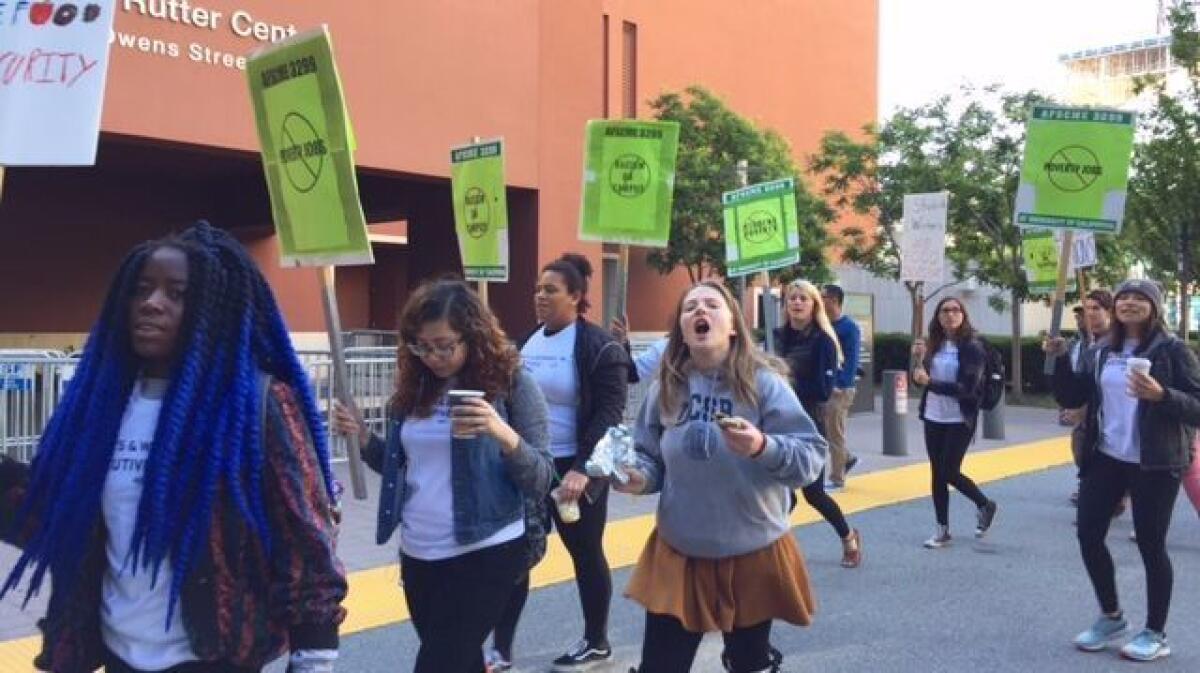UC regents meeting disrupted by protests over state audit finding of undisclosed surplus

Reporting from San Francisco — A stinging state audit of University of California budget operations cast a long shadow over a UC regents meeting Wednesday, as students and union members chastised officials for raising tuition while squirreling away millions.
On Thursday, State Auditor Elaine Howle will talk to the regents about her findings that the UC Office of the President failed to disclose $175 million in surplus funds, paid excessive salaries and inappropriately interfered in campuses’ replies to her auditors’ confidential surveys.
But many of those who spoke during public comments on Wednesday were in no mood to wait for the agenda item. They said that if the UC Office of the President had extra money stashed away, it should not only have avoided a 2.5% tuition hike next fall but raised pay for low-wage workers and given homeless and sometimes hungry students more support.
“Shame on you, Janet Napolitano. Shame on you, UCOP,” said graduate student instructor Hannah Kagan-Moore.
Taylor Chanes, a fourth-year UC Irvine student majoring in political science and education, told regents that students like her were struggling with substantial student debt and diminished campus services. She said later that financial aid covers her tuition, but she has taken out $27,000 in loans, mostly for housing.
After public comments, students and union members stood up and chanted, “Hey regents, step off it! The people over profit!” But they left peacefully when UC police told them to clear the room or face arrest.
Some speakers came to UC’s defense, saying it was being unfairly criticized. Rejeana Mathis, a UCLA manager and chairwoman of the Council of UC Staff Assemblies, said it was fair to question UC’s transparency and integrity, but when she heard some of the political posturing, she felt like “an angry big sister wanting folks to stop picking on UC.”
Napolitano, the UC president, has disputed the $175-million surplus, which she has said is really $38 million. The rest of the money was budgeted, she said, for such initiatives as aid to victims of sexual violence and students who are in the country illegally.
In her opening remarks Wednesday, Napolitano said UC was “hard at work” implementing the state auditor’s 33 recommendations to improve her office’s budget practices.
Nathan Brostrom, UC chief financial officer, said the surplus cited in the audit represented one-time funds that have been committed to other programs and services, and he added that there were no plans to roll back the tuition increase.
James Chalfant, chairman of the UC Academic Senate, said flashy headlines about secret slush funds and “politicians’ sound bites” show a lack of understanding of UC’s enormous and complex organization. He said what needs to be discussed is how UC, with diminished state support, can make headway on such pressing challenges as the academic achievement gap, capital needs and unfunded pension liabilities.
“Right now, we have a mess on our hands, and we all need to work together to fix it,” he said.
In other business, regents discussed how to bring in more transfer students, especially to less popular campuses. Under a 2015 budget agreement between Napolitano and Gov. Jerry Brown, UC agreed to boost efforts to enroll one transfer student for every two freshmen — a ratio set by the 1960 California Master Plan for Higher Education.
Brown announced last week he would hold back $50 million in UC funding for 2017-18 until the university made more progress in increasing transfer students and implementing the auditor’s proposed reforms of budget practices.
UC officials told regents they admitted the largest transfer class in the university system’s history last fall and were on track to meet the 2:1 ratio systemwide in 2017-18 — even though applications from freshmen surged and those from transfer students were down about 4%. The decline in transfer applications, which are mostly from state community colleges, is probably an after-effect of recession-era budget cuts, which sharply reduced class offerings and made it difficult for students to complete the coursework needed to transfer, said Regent Eloy Oakley Ortiz, who heads the 113-campus California Community Colleges system.
All campuses but UC Riverside, UC Santa Cruz and UC Merced expect to meet the transfer goal. UC Riverside Chancellor Kim Wilcox said his campus admits 60% of applicants, but only 20% of them choose to come. Challenges include UC Riverside’s distance from most community colleges, competition from other universities and many students’ struggles to master skills needed for UC work, he said. Only 7% of Riverside City College students, he said, have acquired the math skills needed for the UC system.
“There’s a huge challenge preparing them,” Wilcox said.
UC has stepped up education and outreach statewide about transfer options and requirements. Nearly half of UC’s transfer students come from fewer than 20 of the 113 California community colleges.
Times staff writer Howard Blume contributed to this report.
Twitter: @teresawatanabe
More to Read
Sign up for Essential California
The most important California stories and recommendations in your inbox every morning.
You may occasionally receive promotional content from the Los Angeles Times.











